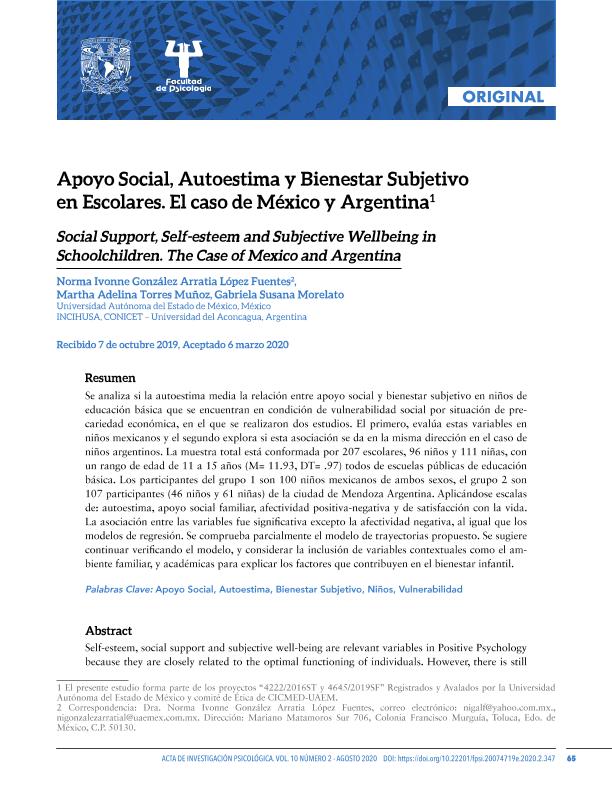Artículo
Se analiza si la autoestima media la relación entre apoyo social y bienestar subjetivo en niños deeducación básica que se encuentran en condición de vulnerabilidad social por situación de precariedad económica, en el que se realizaron dos estudios. El primero, evalúa estas variables enniños mexicanos y el segundo explora si esta asociación se da en la misma dirección en el caso deniños argentinos. La muestra total está conformada por 207 escolares, 96 niños y 111 niñas, conun rango de edad de 11 a 15 años (M= 11.93, DT= .97) todos de escuelas públicas de educaciónbásica. Los participantes del grupo 1 son 100 niños mexicanos de ambos sexos, el grupo 2 son107 participantes (46 niños y 61 niñas) de la ciudad de Mendoza Argentina. Aplicándose escalasde: autoestima, apoyo social familiar, afectividad positiva-negativa y de satisfacción con la vida.La asociación entre las variables fue significativa excepto la afectividad negativa, al igual que losmodelos de regresión. Se comprueba parcialmente el modelo de trayectorias propuesto. Se sugierecontinuar verificando el modelo, y considerar la inclusión de variables contextuales como el ambiente familiar, y académicas para explicar los factores que contribuyen en el bienestar infantil. Self-esteem, social support and subjective well-being are relevant variables in Positive Psychology because they are closely related to the optimal functioning of individuals. However, there is still little research that analyzes these variables together and there are no references to this in the case of children in a situation of psychosocial vulnerability. So the objective is to analyze if self-esteem mediates the relationship between social support and subjective well-being. With a cross-sectional design, two studies were carried out, the first of them, evaluates the relationship of these variables in a sample of Mexican children. The second one explores if this association occurs in the same direction in the case of Argentine children. The total sample consists of 207 schoolchildren of which 96 are boys and 111 are girls, with an age range from 11 to 15 years (M = 11.93, SD = .97) all of them from public schools of basic education. The participants of group 1 are 100 Mexican children of both sexes equally represented, and in the group 2, 107 children participate (46 boys and 61 girls) residing in the city of Mendoza, Argentina. Applying the scales of: self-esteem, family social support, positive-negative affectivity, satisfaction with life and a sociodemographic questionnaire. Descriptive analysis, correlation analysis, simple linear regression analysis and a path model were tested. The association between the variables was significant except the negative affectivity, as well as the regression models. The proposed initial model was partially verified, both in group 1 and group 2. The findings suggest to continue verifying the model, as well as considering the inclusion of contextual variables such as the family environment, and academic ones that explain the factors that contribute to the well-being of children.
Apoyo social, autoestima y bienestar subjetivo en escolares: El caso de México y Argentina
Título:
Social support, self-esteem and subjective wellbeing in schoolchildren: The case of Mexico and Argentina
González Arratia López Fuentes, Norma Ivonne; Torres Muñoz, Marta Adelina; Morelato, Gabriela Susana

Fecha de publicación:
08/2020
Editorial:
Universidad Nacional Autónoma de México
Revista:
Acta de investigación psicológica
ISSN:
2007-4832
e-ISSN:
2007-4719
Idioma:
Español
Tipo de recurso:
Artículo publicado
Clasificación temática:
Resumen
Palabras clave:
APOYO SOCIAL
,
AUTOESTIMA
,
BIENESTAR SUBJETIVO
,
VULNERABILIDAD
Archivos asociados
Licencia
Identificadores
Colecciones
Articulos(INCIHUSA)
Articulos de INST. DE CS. HUMANAS, SOC. Y AMBIENTALES
Articulos de INST. DE CS. HUMANAS, SOC. Y AMBIENTALES
Citación
González Arratia López Fuentes, Norma Ivonne; Torres Muñoz, Marta Adelina; Morelato, Gabriela Susana; Apoyo social, autoestima y bienestar subjetivo en escolares: El caso de México y Argentina; Universidad Nacional Autónoma de México; Acta de investigación psicológica; 10; 2; 8-2020; 65-79
Compartir
Altmétricas



